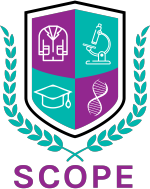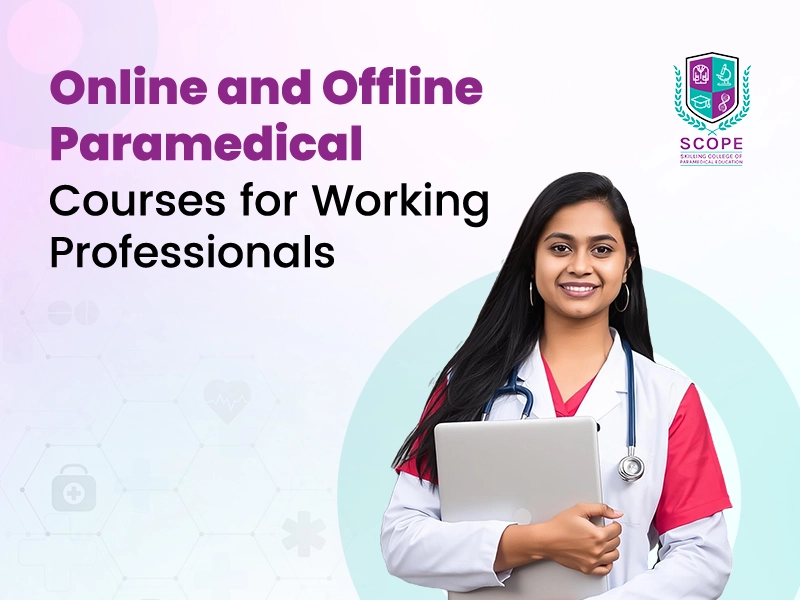In today’s fast-paced world, balancing a career and education is a challenge. For working professionals looking to upskill in the healthcare sector, paramedical courses are the ideal choice. These courses equip you with practical, job-ready skills in high-demand medical fields, enabling you to grow your career without compromising your current job.
SCOPE College, a pioneer in paramedical education, offers a variety of flexible programs tailored for working professionals. With a focus on practical training, blended learning, and internships at renowned industry partners, these courses provide the foundation for a fulfilling healthcare career.
Why Paramedical Courses Are Ideal for Working Professionals
1. Flexible Learning Options
SCOPE College provides weekend batches and online classes that accommodate the busy schedules of working professionals. This allows you to learn while you earn, making education more accessible.
2. Hands-On Training for Real-World Skills
With state-of-the-art labs and internships in government hospitals, SCOPE College emphasizes practical training. This ensures that you’re job-ready from day one.
3. Career Growth and Stability
Paramedical professionals are in high demand across the globe. Completing these courses opens up opportunities for stable, high-paying jobs and future specialization
Paramedical Courses Offered by SCOPE College for Working Professionals
1. Certification in Medical Laboratory Technician (CMLT)
Course Overview:
The CMLT course trains you to perform diagnostic tests and operate lab equipment. You’ll gain expertise in handling specimens and understanding lab processes, crucial for accurate disease diagnosis.
Key Skills You’ll Learn:
- Basic and advanced pathology techniques.
- Use and maintenance of diagnostic equipment.
- Procedures for specimen collection, storage, and analysis.
Career Benefits:
- Become a certified lab technician in hospitals, clinics, and diagnostic labs.
- High demand for skilled professionals in pathology labs.
Learn More:
Certification in Medical Laboratory Technician
2. Diploma in Cardiology Technician Assistant
Course Overview:
This diploma program focuses on training students to assist cardiologists in diagnosing and treating heart conditions. With an increasing prevalence of cardiovascular diseases, this course is highly relevant.
Key Skills You’ll Learn:
- Operating ECG and stress test machines.
- Monitoring patient vitals during cardiac procedures.
- Understanding cardiac anatomy and disease processes.
Career Benefits:
- Work in cardiology units, diagnostic centers, and research labs.
- Significant career growth opportunities in cardiac care.
Learn More:
Diploma in Cardiology Technician Assistant
RELATED:
Top Cardiology Courses After 12th: Your Path to a Heart Specialist
3. Certificate Course in Operation Theatre Technician
Course Overview:
This course equips you to assist in operation theatres by preparing instruments, maintaining sterile environments, and supporting surgeons during procedures.
Key Skills You’ll Learn:
- Pre-surgery preparation and equipment sterilization.
- Handling surgical instruments and assisting surgeons.
- Understanding surgical protocols and patient safety measures.
Career Benefits:
- Work in operation theatres in hospitals and surgical centers.
- High demand for OT technicians in healthcare facilities globally.
Learn More:
Certificate Course in Operation Theatre Technician
Also Read:
Average Operation Theatre Technician Salary: What to Expect
4. Cardiology Technician Assistant
Course Overview:
This course provides specialized training in cardiac care, focusing on operating diagnostic tools and patient management during cardiac treatments.
Key Skills You’ll Learn:
- Mastery of echocardiogram machines and stress test equipment.
- In-depth knowledge of cardiovascular anatomy and diseases.
- Patient care before, during, and after procedures.
Career Benefits:
- Work in advanced cardiology units and specialized clinics.
- Play a key role in cardiac diagnostics and treatment.
Learn More:
Cardiology Technician Assistant
5. Radiology Technician Assistant
Course Overview:
This program trains you to work with imaging technologies such as X-rays, CT scans, and MRIs. Radiology technicians are essential for accurate disease diagnosis and treatment planning.
Key Skills You’ll Learn:
- Operating and maintaining radiology equipment.
- Capturing and analyzing clear diagnostic images.
- Ensuring patient safety during imaging procedures.
Career Benefits:
- Join diagnostic labs, hospitals, and research facilities.
- Significant demand for radiology technicians worldwide.
Learn More:
Radiology Technician Assistant
Related:
What to Expect from Radiology Courses After 12th: Scope and Curriculum
Essential Skills for Securing Radiology Technician Jobs
What is the Average Salary of Radiology Technician in India?
6.Phlebotomy Technician
Course Overview:
This short-term course focuses on training students in drawing blood samples for testing, transfusions, or donations. Phlebotomy technicians are integral to diagnostic healthcare teams.
Key Skills You’ll Learn:
- Safe and hygienic blood collection techniques.
- Patient interaction and reassurance during procedures.
- Proper labeling and transportation of blood samples.
Career Benefits:
- Immediate job opportunities in labs, clinics, and hospitals.
- Always in demand due to the essential nature of blood testing.
Learn More:
Phlebotomy Technician
Also Read: What is a Phlebotomist: Key Responsibilities and Career Opportunities
Why Choose SCOPE College for Paramedical Education?
- Blended Learning Options: Flexible online and offline courses for working professionals.
- Hands-On Training: Real-world experience through government hospital internships.
- 100% Job Placement: Guaranteed placement support with global and local opportunities.
- Financial Aid and Support: Affordable education with financial assistance.
- State-of-the-Art Facilities: Access to advanced labs and experienced faculty.
Also Read:
- What Are the Paramedical Courses?
- Pathology Courses After 12th
- High Salary Medical Careers Without NEET
Conclusion
Paramedical courses are a gateway to a rewarding career in the ever-growing healthcare industry. For working professionals, these courses provide the perfect opportunity to upskill without compromising their current job responsibilities. Whether you’re interested in diagnostics, operation theatre management, or cardiac care, SCOPE College offers flexible and practical programs tailored to your needs.
With a strong focus on hands-on training, government hospital internships, and global placement opportunities, SCOPE College ensures you’re job-ready from day one. Don’t let a busy schedule hold you back—take the next step toward a successful career in healthcare today.
Contact SCOPE College for More Information or Enroll Now and unlock your potential in the paramedical field!
FAQs
Which is the best course for working professionals?
The Certification in Medical Laboratory Technician (CMLT) is an excellent choice for working professionals. It provides versatile skills for roles in labs and clinics, offering career flexibility.
Which is the best short-time course?
The Phlebotomy Technician Course is a short-term program that equips students with quick skills to secure jobs in diagnostic labs and hospitals.
Which course is in most demand?
The Radiology Technician Assistant program is in high demand due to the critical role of imaging in diagnosing diseases.
What is the best professional course to study?
For comprehensive training and long-term growth, the Diploma in Cardiology Technician Assistant offers excellent prospects in cardiac healthcare.

